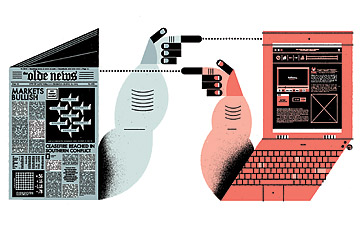
When the online information trove Wikipedia went dark for 24 hours on Jan. 18, the greatest impact was probably on panicked college students facing deadlines. But Wikipedia's larger message was clear: none of us should take for granted the freedom and openness that have made the Web such a world-changing resource. Why make that point now? Because Wikipedia and several other major Internet companies fear the Internet is facing a serious threat from potential government regulation. Under intense pressure from movie studios and big music and media companies, Congress has been moving to create new legal powers to crack down on websites that offer illegal streaming and downloading of movies, music and other copyrighted content.
Two bills in Congress, the House's Stop Online Piracy Act (SOPA) and the Senate's Protect Intellectual Property Act, would empower courts to make search engines like Google block alleged copyright violators from their search results and force advertisers to cut off payments to offending sites. That has unleashed the latest battle in the long-running war between Hollywood and Silicon Valley over how to balance copyright issues with Internet freedom. The showdown in Congress pits the recording and movie industries' well-connected lobbyists against the dotcoms' combined power of popular Internet sentiment and their own equally well-connected lobbyists. (Among the supporters of the legislation is Time's corporate parent, Time Warner.)
Hence the Wikipedia blackout and declarations of protest from other popular sites, such as the discussion board Reddit and the beloved site I Can Has Cheezburger? With Congress gauging how to proceed, here's how the battle over where your Web browser can go is playing out.
PIRACY OR CENSORSHIP?
PRO: Online piracy is a plague that steals profits not just from big movie studios and record labels but also from actors, musicians and their supporting casts. It drains as much as $58 billion per year from the economy and threatens millions of jobs, by some estimates. Current law allows for limited action against pirate sites, but cracking down on foreign sites that may be beyond the reach of U.S. law would require new legal powers. Would Wikipedia just sit back and let other sites steal its material?
CON: Where are we, China? In the U.S., we don't tell people what sites they can look at. The Obama White House was right to express concern about "the risk of online censorship." The bills are too broad and would have unintended consequences. They would ensnare small sites that have done nothing wrong in expensive legal battles. Larger sites like YouTube and Facebook would have to begin burdensome new monitoring of their users' activities or risk legal action because a few teenage girls posted a video of themselves bopping around to a copyrighted Katy Perry song.
AT WHAT COST?
PRO: Censorship is a misleading emotional buzzword. This isn't about free speech; it's about grand larceny. Sites like YouTube and Facebook don't need to worry. The law would target only foreign websites that "have no reason for existence other than copyright theft," as a recording-industry spokesman puts it. A law-abiding Web user would never notice a difference. You can still has cheezburger, people!
